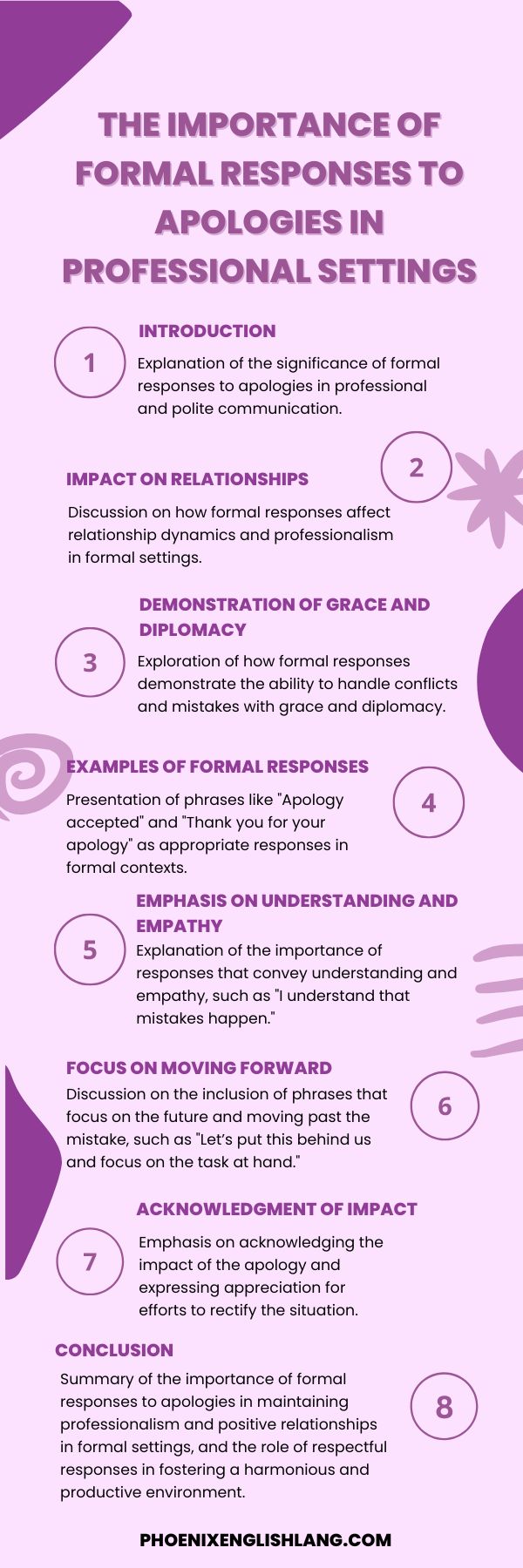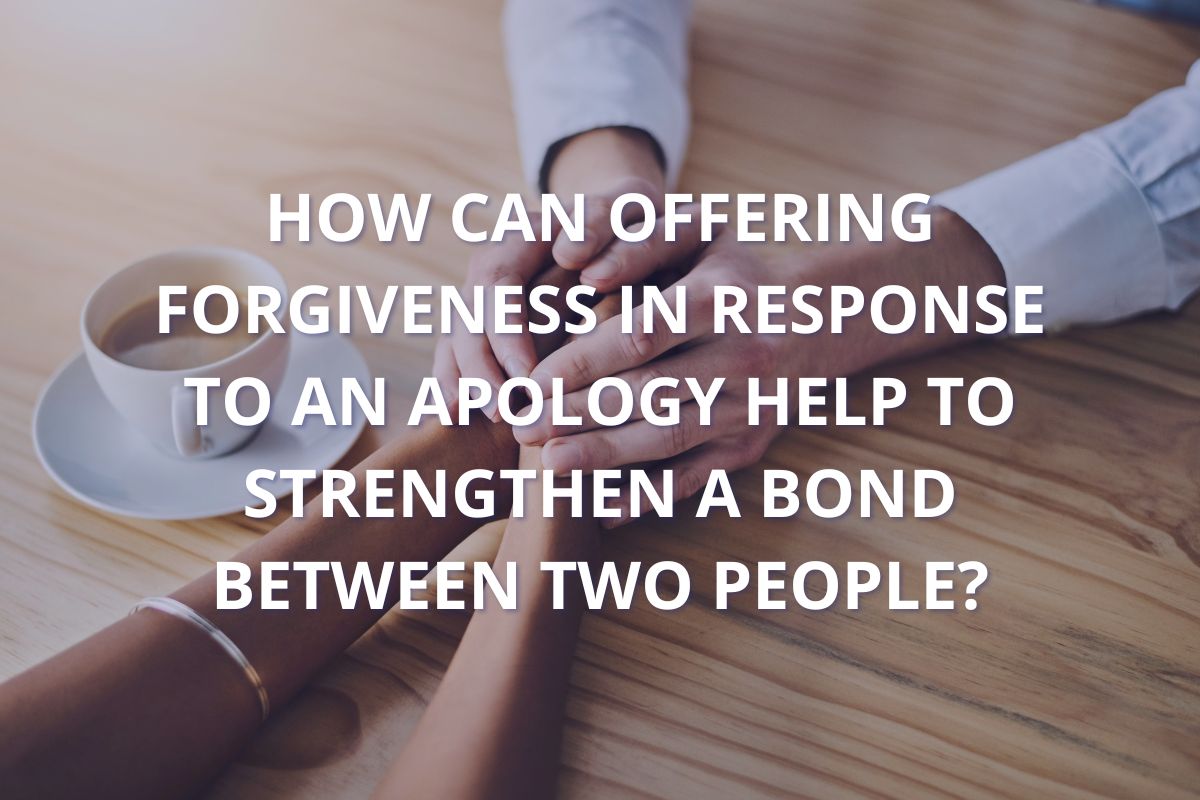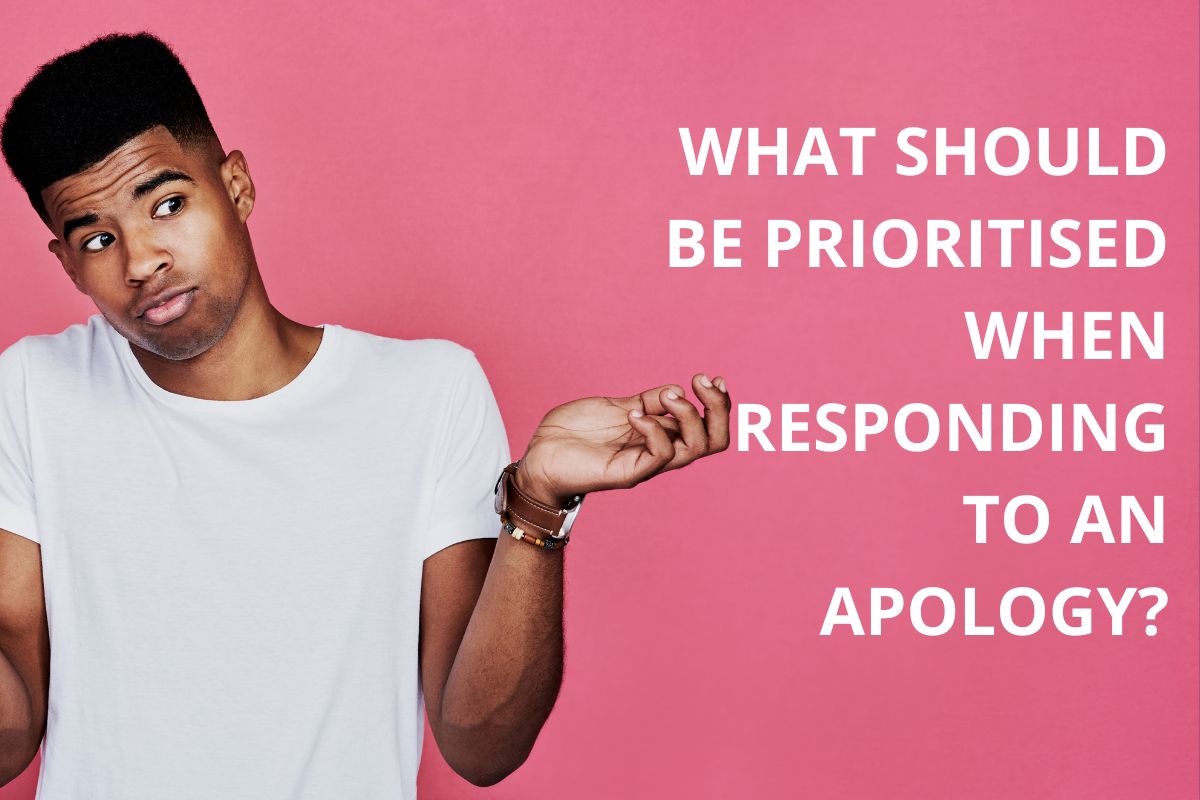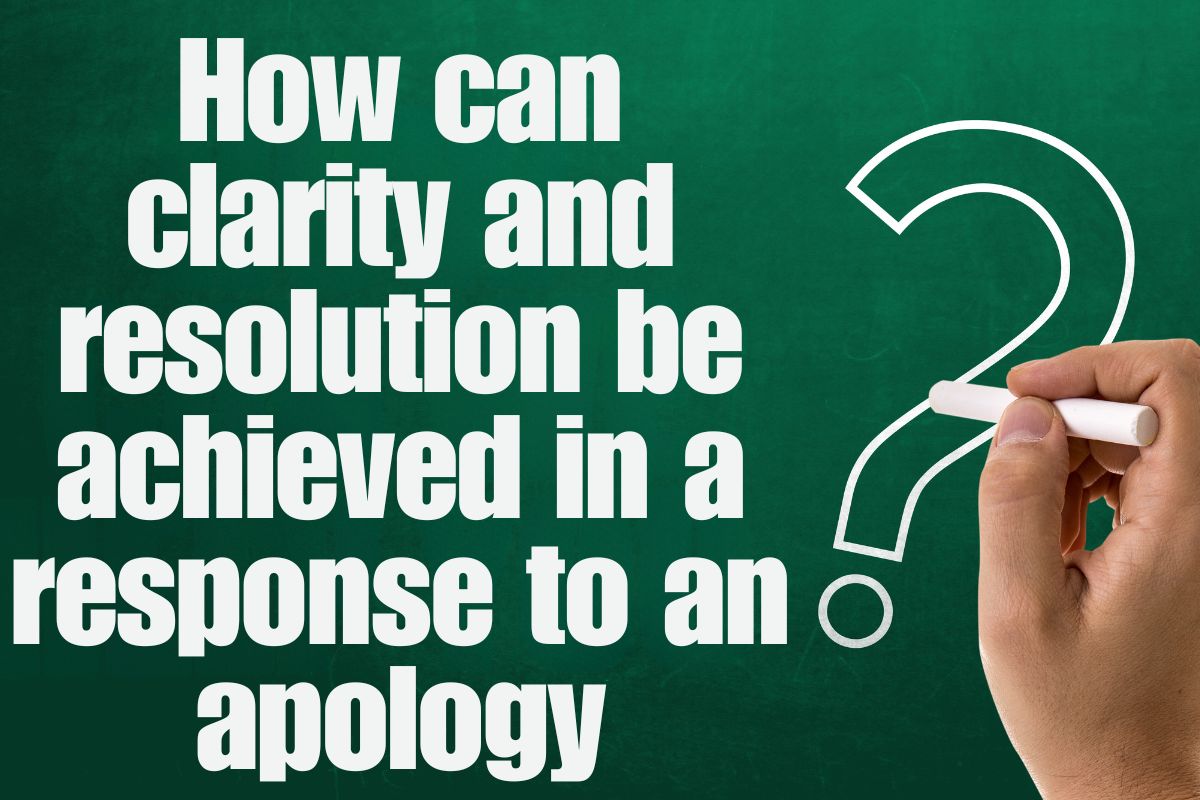When someone apologises to you, it can be difficult to know how to respond. While the natural reaction may be to accept the apology and move on, there are actually several ways to respond to an apology, depending on the situation and the relationship you have with the person who is apologising.
In this article, I’m going to teach you how to respond to an apology, as it’s been an issue for many of my students. So, keep on reading if you’re interested to learn more about responding apologies!
The first and most common way to respond to an apology is to simply accept it. This is often the best course of action in minor situations where the apology is sincere and the offence was not too serious.
By accepting the apology, you are acknowledging that you appreciate the other person’s remorse and are willing to move past the incident. This can help to restore harmony and goodwill in the relationship.
In more serious situations, it may be necessary to have a deeper conversation about the apology. If the offence was significant and has caused real harm, it may be important to discuss the impact of the actions and the steps that can be taken to prevent it from happening again in the future.
In this case, a response to the apology might involve expressing your feelings about the situation and working towards a resolution that both parties can agree on.
Another way to respond to an apology is to offer forgiveness. This can be a powerful and healing response, especially in situations where the offence was intentional or hurtful.
By forgiving the person who has apologised, you are letting go of any resentment or anger you may be holding onto and allowing the relationship to move forward in a positive way.
It can also be a way to show empathy and understanding towards the person who is apologising, and can help to strengthen the bond between you.
In some cases, it may be necessary to take some time to consider the apology before responding. If you are still feeling hurt or upset, it is okay to take some time to process your emotions and decide on the best course of action.
It is important to be honest with yourself and with the other person about your feelings, and to communicate openly and respectfully about the situation.
Finally, it is important to remember that not all apologies are sincere. If you have reason to believe that the apology is not genuine, it is okay to express your doubts and concerns. It is important to trust your instincts and to prioritise your own well-being in any situation.
There are several ways to respond to an apology, depending on the circumstances and the nature of the relationship.
Whether you choose to accept the apology, have a deeper conversation, offer forgiveness, take time to consider your response, or express your doubts, it is important to respond in a way that feels authentic to you and that prioritises open and honest communication. By doing so, you can work towards resolving the situation and moving forward in a positive and healthy way.
You might also enjoy: How Long Is Soon: Usage + Examples[2024]
Examples to Respond to an Apology in English
Apologies are an essential part of human interaction, as they allow individuals to acknowledge their mistakes, take responsibility, and seek forgiveness.
When someone apologises, it is important to respond in a thoughtful and appropriate manner.
In the English language, there are numerous phrases that can be used to respond to an apology.
This essay will explore 20 of the best phrases to respond to an apology in English, highlighting their meaning and appropriate usage.
1. “Apology accepted.” – This phrase conveys that the apology has been acknowledged and forgiven.
2. “No worries.” – This response indicates that the mistake or offence is not a cause for concern or distress.
3. “It’s all right.” – This phrase reassures the person that their apology is accepted and that there are no hard feelings.
4. “I appreciate your apology.” – This response acknowledges the person’s effort to apologise and shows gratitude for their sincerity.
5. “Thank you for saying sorry.” – This phrase expresses gratitude for the person’s willingness to apologise and take responsibility for their actions.
6. “I understand.” – This response demonstrates empathy and understanding towards the person who is apologising.
7. “Don’t worry about it.” – This phrase indicates that the mistake or offence is not significant enough to cause distress or concern.
8. “It’s water under the bridge.” – This response suggests that the issue or mistake is in the past and should be forgotten or forgiven.
9. “Let’s move on.” – This phrase encourages both parties to leave the incident behind and focus on the future.
10. “I accept your apology.” – This response explicitly states that the apology is accepted and forgiven.
11. “I forgive you.” – This phrase conveys that the person’s apology is accepted and that there are no lingering negative feelings.
12. “No harm done.” – This response indicates that the mistake or offence did not cause any lasting damage or harm.
13. “It’s okay, everyone makes mistakes.” – This phrase reassures the person that mistakes are a natural part of being human and that forgiveness is granted.
14. “I appreciate your honesty.” – This response acknowledges the person’s sincerity and openness in admitting their mistake.
15. “Let’s put this behind us.” – This phrase suggests that both parties should move on from the incident and not dwell on it.
16. “I understand that it was unintentional.” – This response acknowledges that the person did not intend to cause harm or offence.
17. “I value our relationship more than this mistake.” – This phrase emphasises the importance of the relationship and conveys that the mistake is not significant enough to damage it.
18. “We all make mistakes, so let’s learn from this.” – This response encourages growth and learning from the mistake, emphasising its potential for personal development.
19. “I know you didn’t mean it.” – This phrase reassures the person that their actions or words were not taken personally and were understood to be unintentional.
20. “Let’s move forward and focus on the future.” – This response encourages both parties to leave the incident in the past and concentrate on building a better future.
Responding to an apology in English requires tact, understanding, and empathy. The 20 phrases mentioned above provide a range of appropriate and thoughtful responses to acknowledge and accept apologies.
By using these phrases, individuals can foster forgiveness, understanding, and stronger relationships in their interactions with others.
Formal Responses to an Apology in English

Formal responses to apologies are an important aspect of professional and polite communication. When someone extends an apology in a formal setting, it is essential to respond in a respectful and appropriate manner.
This essay will explore the significance of formal responses to apologies and provide examples of phrases that can be used to respond in a formal context.
In formal settings, such as professional environments or formal social gatherings, the way we respond to apologies can have a significant impact on the dynamics of the relationship and the perception of our professionalism.
Formal responses to apologies demonstrate our ability to handle conflicts and mistakes with grace and diplomacy.
One commonly used phrase to respond to an apology in a formal context is “Apology accepted.”
This response conveys that the apology has been acknowledged and forgiven, while maintaining a professional tone.
It shows that the person extending the apology is taken seriously and that their efforts to make amends are appreciated.
Another appropriate response is “Thank you for your apology.” This phrase expresses gratitude for the person’s willingness to acknowledge their mistake and take responsibility for it. It acknowledges their effort to rectify the situation and shows respect for their sincerity.
In a formal setting, it is also common to respond with phrases that emphasise understanding and empathy.
For example, “I understand that mistakes happen” or “I appreciate your honesty and accountability” can convey a sense of empathy and understanding towards the person who is apologising.
These responses show that we recognise the fallibility of human nature and are willing to move forward without holding grudges.
Additionally, formal responses to apologies often include phrases that focus on the future and moving forward.
For instance, “Let’s put this behind us and focus on the task at hand” or “I value our professional relationship and believe we can move past this” demonstrate a commitment to moving forward and not dwelling on the mistake.
These responses emphasise the importance of maintaining a positive and productive working relationship.
It is also important to acknowledge the impact of the apology in a formal response.
Phrases such as “I appreciate your efforts to rectify the situation” or “Your apology demonstrates your commitment to professionalism” show that we recognise the significance of the apology and its effect on the relationship or situation.
These responses convey a sense of respect and appreciation for the person’s willingness to make amends.
Formal responses to apologies are crucial in maintaining professionalism and positive relationships in formal settings.
The phrases mentioned above provide examples of appropriate and respectful responses that demonstrate understanding, empathy, and a commitment to moving forward.
By responding to apologies in a formal manner, we can foster an atmosphere of respect and professionalism, contributing to a harmonious and productive environment.
You might also enjoy: Themself Or Themselves: Differences + Examples + Usage [2024]
Informal Responses to an Apology in English
In informal settings, such as casual conversations or interactions among friends and family, the way we respond to apologies can vary in tone and style.
Informal responses to apologies often prioritise maintaining a relaxed and friendly atmosphere while still acknowledging the sincerity of the apology.
This essay will explore the significance of informal responses to apologies and provide examples of phrases that can be used to respond in an informal context.
When someone offers an apology in an informal setting, it is important to respond in a way that reflects the casual nature of the interaction.
One common phrase used to respond to an apology in an informal context is “No worries.” This response conveys that the mistake or offence is not a cause for concern or distress. It reassures the person that their apology is accepted and that there are no hard feelings.
Another popular response is “It’s all good.” This phrase indicates that the mistake or offence is not significant enough to cause distress or concern.
It suggests that the situation is not a big deal and that the relationship remains unaffected by the apology.
In informal settings, it is also common to respond with phrases that emphasise understanding and empathy. For example, “I get it, we all make mistakes” or “Don’t sweat it, I’ve been there too” can convey a sense of empathy and camaraderie towards the person who is apologising.
These responses show that we recognise the fallibility of human nature and that we understand and accept their apology without judgment.
Additionally, informal responses to apologies often include phrases that focus on moving forward. For instance, “Let’s forget about it and move on” or “No harm done, let’s have some fun” demonstrate a desire to leave the incident behind and continue enjoying each other’s company. These responses emphasise the importance of maintaining a relaxed and positive atmosphere in the relationship.
In informal settings, it is also common to respond to an apology with humour or light-heartedness. For example, “Apology accepted, but you owe me a coffee” or “I forgive you, but you you owe me a favour” can add a playful element to the response. These responses show that we are not taking the apology too seriously and are willing to make light of the situation.
Informal responses to apologies prioritise maintaining a relaxed and friendly atmosphere while still acknowledging the sincerity of the apology.
The phrases mentioned above provide examples of appropriate and lighthearted responses that demonstrate understanding, empathy, and a desire to move forward.
By responding to apologies in an informal manner, we can foster a sense of camaraderie and maintain positive relationships in casual settings.
How can offering forgiveness in response to an apology help to strengthen a bond between two people?

Offering forgiveness in response to an apology can be a powerful way to strengthen the bond between two people in several ways.
First and foremost, offering forgiveness demonstrates empathy and understanding towards the person who has apologised.
It shows that you are willing to let go of any resentment or anger you may be holding onto and are open to moving forward in a positive way.
This can create a sense of relief and gratitude in the person who has apologised, and can help to build trust and goodwill in the relationship.
Forgiveness can also be a healing and transformative experience for both parties involved. By offering forgiveness, you are choosing to release negative emotions and move towards a more positive and harmonious state.
This can create a sense of emotional release and liberation for both the forgiver and the forgiven, and can pave the way for a deeper and more authentic connection between the two people.
Furthermore, offering forgiveness can be a way to demonstrate your commitment to the relationship and your willingness to work through challenges and conflicts.
It shows that you value the relationship enough to let go of past grievances and to prioritise the well-being and growth of the relationship. This can create a sense of mutual respect and understanding, and can lay the foundation for a stronger and more resilient bond.
Finally, offering forgiveness can be a way to foster personal growth and self-awareness.
It can be a way to practice empathy, compassion, and resilience, and can help to cultivate a sense of emotional maturity and wisdom.
By offering forgiveness, you are choosing to take the high road and to prioritise the well-being of the relationship over your own ego, which can be a powerful and transformative experience for both parties involved.
Offering forgiveness in response to an apology can help to strengthen the bond between two people by creating a sense of relief and gratitude, fostering healing and transformation, demonstrating commitment to the relationship, and fostering personal growth and self-awareness.
It can be a powerful and transformative experience that can help to build trust, understanding, and resilience in the relationship, and can pave the way for a deeper and more authentic connection between the two people.
You might also enjoy: How Are You Fairing or Faring? Differences + Examples
What should be prioritised when responding to an apology?

When responding to an apology, several key factors should be prioritised to ensure that the response is appropriate and constructive. These include:
1. Empathy and Understanding: Prioritise empathy and understanding towards the person who is apologising. Acknowledge their remorse and the effort they have made to apologise.
2. Honest Communication: Prioritise open and honest communication about your feelings and the impact of the apology. Expressing your emotions and concerns can lead to a deeper understanding and resolution.
3. Personal Well-being: Prioritise your own well-being in the situation. If you are still feeling hurt or upset, it’s important to take the time to process your emotions before responding.
4. Relationship Dynamics: Consider the nature of the relationship with the person who is apologising. Prioritise the maintenance and improvement of the relationship, especially in cases where forgiveness and resolution are key to its well-being.
5. Clarity and Resolution: Prioritise clarity and resolution in your response. If the situation warrants a deeper conversation about the apology, prioritise working towards a resolution that both parties can agree on.
By prioritising these factors when responding to an apology, you can ensure that the response is thoughtful, considerate, and contributes to the well-being of both parties and the relationship as a whole.
You might also enjoy: Performed Vs Preformed: Which One Is Correct? + Examples [2024]
How can clarity and resolution be achieved in a response to an apology?

1.Articulate Your Emotions: It is essential to convey how the actions in question have influenced you and to share your emotional response to the situation. This approach enables the individual who has offered an apology to comprehend the repercussions of their behavior.
Honesty and specificity regarding your feelings are crucial. For instance, rather than simply stating, “I was upset,” you could express, “I felt deeply hurt and betrayed when you failed to attend my significant event.”
Such detailed expressions allow the other person to understand the intensity of your emotions and the importance of their actions.
2.Pursue Clarity: Request clarification or additional details as necessary. Aim to comprehend the motivations for the apology and the measures being implemented to avert similar occurrences in the future.
This requires attentive listening and the formulation of open-ended inquiries. For example, you could ask, “Could you explain what contributed to this situation?” or “What actions do you intend to take to prevent a recurrence?” By pursuing clarity, you demonstrate your readiness to participate in a productive conversation and strive for a resolution.
3.Explore Remedial Measures: In instances where the offense has resulted in genuine harm, it is essential to explore possible remedial measures or strategies to avert the recurrence of similar incidents in the future.
This dialogue can facilitate a resolution and establish a pathway for progress. Engaging in collaborative brainstorming of solutions can yield significant benefits.
4.Establish Boundaries: It is essential to articulate any necessary boundaries or expectations for the future to avert the recurrence of similar situations. Defining boundaries is vital for fostering a healthy relationship.
You may express, “In the future, I require you to inform me if you anticipate being late,” or “I expect openness and honesty as we proceed.” Clearly defined boundaries enable both individuals to comprehend each other’s expectations, thereby minimizing the potential for future disputes.
5.Articulate Forgiveness: When you feel prepared to forgive, it is important to articulate your forgiveness and your intention to progress. This act can reinforce a resolution and facilitate healing and reconciliation. Forgiveness serves as a significant step towards recovery.
You can convey this sentiment by stating, “I forgive you, and I am ready to move forward,” or “Let us put this behind us and focus on rebuilding our trust.” By expressing forgiveness, you indicate your willingness to let go of the past and shift your focus to what lies ahead.
Conclusion
Engaging in open and honest communication, striving to comprehend the circumstances, exploring possible solutions, establishing necessary boundaries, and offering forgiveness can lead to clarity and resolution in response to an apology.
This method enables both parties to progress positively and constructively, enhancing mutual understanding and fortifying the relationship.
In summary, attaining clarity and resolution in response to an apology is a complex endeavor that necessitates dedication and effort from both individuals involved.
It encompasses sincere dialogue, a desire to grasp and tackle the fundamental issues, and a willingness to forgive and advance. By adhering to these principles, one can transform a challenging situation into a chance for personal growth and a deeper connection.
Whether in personal relationships, professional environments, or other contexts, these guidelines can assist in managing apologies and conflicts with compassion and understanding, ultimately resulting in stronger and more resilient relationships.

Hi, welcome to my blog! My name is Omid and I am thrilled to have you here! I am an English language teacher with 12 years of experience and hold multiple international certifications (TESOL, IELTS, TOEFL, PTE, CELTA). Additionally, I hold a PhD in Applied Linguistics with a specialization in Teaching English as a Second Language (TESL), which fuels my passion for teaching English and assisting others in mastering the language. To me, nothing is more rewarding than helping individuals enhance their English language abilities through various methods. So, let’s embark on this journey of learning English together.




